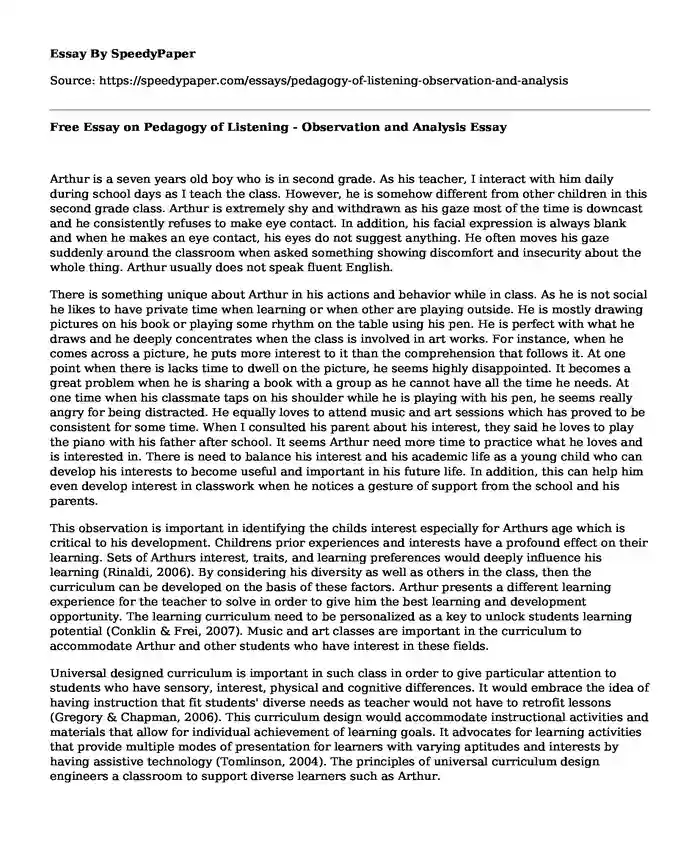Arthur is a seven years old boy who is in second grade. As his teacher, I interact with him daily during school days as I teach the class. However, he is somehow different from other children in this second grade class. Arthur is extremely shy and withdrawn as his gaze most of the time is downcast and he consistently refuses to make eye contact. In addition, his facial expression is always blank and when he makes an eye contact, his eyes do not suggest anything. He often moves his gaze suddenly around the classroom when asked something showing discomfort and insecurity about the whole thing. Arthur usually does not speak fluent English.
There is something unique about Arthur in his actions and behavior while in class. As he is not social he likes to have private time when learning or when other are playing outside. He is mostly drawing pictures on his book or playing some rhythm on the table using his pen. He is perfect with what he draws and he deeply concentrates when the class is involved in art works. For instance, when he comes across a picture, he puts more interest to it than the comprehension that follows it. At one point when there is lacks time to dwell on the picture, he seems highly disappointed. It becomes a great problem when he is sharing a book with a group as he cannot have all the time he needs. At one time when his classmate taps on his shoulder while he is playing with his pen, he seems really angry for being distracted. He equally loves to attend music and art sessions which has proved to be consistent for some time. When I consulted his parent about his interest, they said he loves to play the piano with his father after school. It seems Arthur need more time to practice what he loves and is interested in. There is need to balance his interest and his academic life as a young child who can develop his interests to become useful and important in his future life. In addition, this can help him even develop interest in classwork when he notices a gesture of support from the school and his parents.
This observation is important in identifying the childs interest especially for Arthurs age which is critical to his development. Childrens prior experiences and interests have a profound effect on their learning. Sets of Arthurs interest, traits, and learning preferences would deeply influence his learning (Rinaldi, 2006). By considering his diversity as well as others in the class, then the curriculum can be developed on the basis of these factors. Arthur presents a different learning experience for the teacher to solve in order to give him the best learning and development opportunity. The learning curriculum need to be personalized as a key to unlock students learning potential (Conklin & Frei, 2007). Music and art classes are important in the curriculum to accommodate Arthur and other students who have interest in these fields.
Universal designed curriculum is important in such class in order to give particular attention to students who have sensory, interest, physical and cognitive differences. It would embrace the idea of having instruction that fit students' diverse needs as teacher would not have to retrofit lessons (Gregory & Chapman, 2006). This curriculum design would accommodate instructional activities and materials that allow for individual achievement of learning goals. It advocates for learning activities that provide multiple modes of presentation for learners with varying aptitudes and interests by having assistive technology (Tomlinson, 2004). The principles of universal curriculum design engineers a classroom to support diverse learners such as Arthur.
References
Conklin, W., & Frei, S. (2007). Differentiating the curriculum for gifted learners. Huntington Beach, CA: Shell Education.
Gregory, G. H., & Chapman, C. M. (2006). Differentiated instructional strategies: One size doesn't fit all. Thousand Oaks, CA: Corwin.
Rinaldi, C. (2006). In dialogue with Reggio Emilia: Listening, researching, and learning. New York: Routledge
Tomlinson, C. (2004). How to differentiate instruction in mixed ability classrooms. Alexandria, VA: ASCD.
Cite this page
Free Essay on Pedagogy of Listening - Observation and Analysis. (2019, Dec 11). Retrieved from https://speedypaper.com/essays/pedagogy-of-listening-observation-and-analysis
Request Removal
If you are the original author of this essay and no longer wish to have it published on the SpeedyPaper website, please click below to request its removal:
- Healthy Food on College Campuses, Essay Example
- Essay Example: Bargaining Power of Suppliers for Nike
- Free Essay Sample: Challenges of Creative Entrepreneurs
- Free Essay on Orientalism in the Films "Wadjda" and "The Battle of Algiers"
- Annotated Bibliography Example on Christian Leadership
- Essay Sample about Sexual Assault Survivors in College Campuses
- Paper Example. Differences Between the Age of Discovery and the Romantic Era
Popular categories





